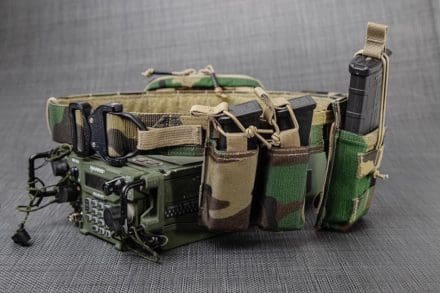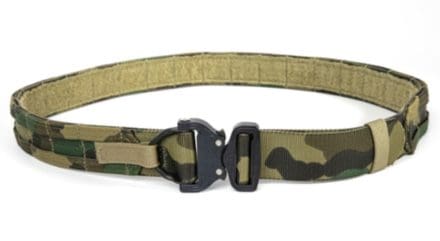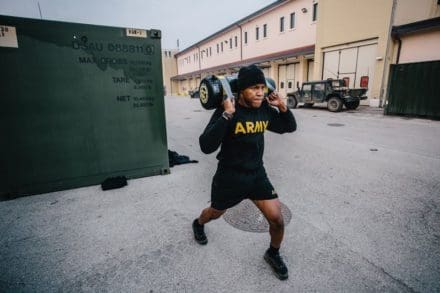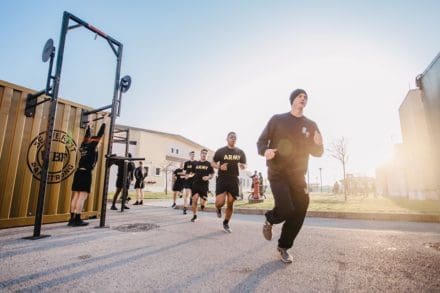Fiscal 2019
•Consolidated sales grow by 1.7% to €6,255 million
•Consolidated operating earnings increase to new record of €505 million
•Order backlog rises to nearly €11 billion
•Operating free cash flow climbs to €314 million
•Dividend to be raised from €2.10 to €2.40
Outlook 2020 before effects of corona developments
•Group operating margin of approximately 7% anticipated
•Automotive expects an operating margin of approximately 5% as the market continues to decline
•Defence anticipates sales growth of between 5% and 7% and a margin of between 9% and 10%
•Annual forecasts will be adjusted if and when necessary due to the potential consequences of the global spread of the coronavirus
Following an overall successful fiscal year, Rheinmetall AG in Düsseldorf plans to raise its dividend by €0.30 to €2.40. The technology group once again recorded growth in both sales and income in fiscal 2019. This is primarily due to the positive business performance of the Defence sector, but Automotive showed robust performance in a weak market environment with overall declining passenger car production.
Armin Papperger, Chief Executive Officer of Rheinmetall AG: “With our profitability and full order books in Defence, our cost efficiency in Automotive and the Group’s financial resources, we are well prepared for the challenges we face. In Defence, we see good opportunities for continuing growth and high profitability. We want to make consistent use of the possibilities provided by military customers around the globe and to keep building on our leading positions. In Automotive, we are in a good position to build on our earlier success once the global automotive markets stabilize after the corona crisis. We will continue to benefit from rising demand for environmentally friendly mobility with our products for reducing consumption and emissions. At the same time, we are selectively expanding our activities in the field of alternative drives, so that we can continue playing an important role as a development partner to the international automotive industry in the future.”
Consolidated operating earnings exceed €500 million for the first time ever in 2019 – proposed dividend of €2.40 per share
In fiscal 2019, Rheinmetall increased its consolidated sales by €107 million or 1.7% year-on-year to €6,255 million. Adjusted for positive currency effects and sales from M&A activities, consolidated sales grew by 0.5%.
The sales growth in fiscal 2019 can be attributed exclusively to increased revenue in the Defence sector, which increased its sales by €301 million or 9.4%. By contrast, sales in the Automotive sector were €194 million lower than the previous year’s figure owing to the declining trend in global automotive production in 2019.
At 69%, the international share of consolidated sales in fiscal 2019 was slightly lower than in the previous year (72%).
In fiscal 2019, Rheinmetall increased its consolidated operating earnings (EBIT before special items) to over €500 million for the first time ever. At €505 million, they were up 2.9% compared with the previous year’s figure of €491 million. The operating margin also improved slightly compared with last year to 8.1% (previous year: 8.0%).
Including positive special items of €7 million net, reported EBIT for the Group amounts to €512 million. Special items resulted from restructuring costs at a Defence location (€-2 million), from a real estate transaction at the Berlin site (€+2 million) and due to insurance payouts (€+7 million). Reported EBIT is therefore only slightly lower than the previous year’s figure of €518 million, which included large, positive special items of €27 million net due chiefly to real estate transactions.
At €354 million, earnings after taxes were the same as in the previous year. After deduction of earnings of €19 million attributable to non-controlling interests (previous year: €49 million), earnings attributable to shareholders of Rheinmetall AG were €335 million. This represents an increase of 9.8% compared with the previous year’s figure of €305 million. Excluding the earnings attributable to non-controlling interests, earnings per share for 2019 amounted to €7.77, compared with €7.10 in the previous year.
The Group’s operating free cash flow increased significantly due to considerable improvements in working capital in particular and rose to €314 million after €-35 million in fiscal 2018.
The Group’s order backlog is more than €10 billion for the first time. On December 31, 2019, Rheinmetall had orders of almost €10,846 million on its books, which equates to growth of 20% compared to the order backlog of €9,055 million in the previous year (December 31, 2018).
The Executive Board and Supervisory Board will propose increasing the dividend to €2.40 per share at the Annual General Meeting on May 5, 2020. This corresponds to a distribution ratio of approximately 31%. A dividend of €2.10 per share was paid in the previous year.
Automotive robust in a weak market environment – operating margin of 6.7%
Rheinmetall Automotive’s performance was influenced by weaker business in the international automotive industry again in 2019. Automotive’s sales sank from €2,930 million in 2018 to €2,736 million in 2019, a reduction of 6.6%. According to the latest market data, global automotive production shrank by nearly 6% in the same period.
All three sector divisions suffered a decline in sales compared with the previous year. Due to the weak performance of the international automotive industry, the ongoing drop in demand for diesel products for the passenger car market was not offset, as in the previous year, by other product groups such as applications for trucks and gasoline drives. As a result, new product launches were postponed or took place on a much smaller scale than anticipated.
In the Mechatronics division, sales declined in the Automotive Emission Systems and Solenoid Valves product areas in particular. In the Hardparts division, sales of small-bore pistons declined in the markets of North America and Brazil, while the European sales market proved weak with regard to plain bearings. In contrast, the Aftermarket division performed well in its global markets overall, with only a slight drop in sales.
The joint ventures in China, which are not included in Rheinmetall AG’s consolidated sales, generated sales totaling €1,010 million in fiscal 2019. Compared with the previous year, this represents growth of 16%. Once again, the companies therefore significantly outperformed the Chinese passenger car market, which registered a 4% decline in production in 2019.
As a result of the drop in sales, the operating earnings of Rheinmetall Automotive (EBIT before special items) amounted to €184 million in the past fiscal year, after a record high of €262 million in the previous year. The operating margin consequently fell to 6.7% after 8.9% in the previous year.
Defence increases margin to 9.8% with significantly higher earnings
Excellent order intake and backlog
The Defence sector’s business performance in 2019 was again characterized by the high worldwide demand in the military sector and by Rheinmetall’s successful positioning in major markets around the globe.
Rheinmetall Defence increased its sales to €3,522 million in the past fiscal year, growing by €301 million or 9.4% compared with the previous year’s figure. Taking into account exchange rate changes and M&A activities, organic growth was 7.6%.
This rise in sales was achieved through, among other factors, the launch of the major Land 400 Phase 2 project for the Australian armed forces and the shipment of transport vehicles to the German armed forces. In addition, the start-up of the major “Future Soldier System” project with the German armed forces contributed to a significant increase in sales in the Electronic Solutions division. The Weapon and Ammunition division, in contrast, suffered a slight year-on-year drop in sales – due primarily to export restrictions in the processing of international orders.
The sector’s order intake remained at a high level. For the second year in a row, the sector received orders for over €5 billion. In fiscal 2019, the order intake amounted to €5,186 million, after €5,565 million in the previous year, in which the largest single order in the company’s history – 211 Boxer vehicles for the Australian armed forces – with a volume of over €2 billion helped set a new order intake record.
Order intake in fiscal 2019 was largely influenced by the acquisition of the major Mechanised Infantry Vehicle (MIV) project, with a value of €1.4 billion, for the delivery of Boxer vehicles to the British armed forces. The book-to-bill ratio in 2019 was 1.5, underscoring the Defence sector’s excellent growth prospects over the coming years.
The order backlog as at December 31, 2019, was €10.4 billion. Compared with the previous year’s figure of €8.6 billion, this represents an increase of €1.8 billion or a good 21%.
The sector also significantly increased its earnings in 2019. The sector’s operating earnings (EBIT before special items) amounted to €343 million in fiscal 2019, after the previous year’s figure of €254 million. This represents an increase of €90 million or 35%. The operating margin therefore climbed from 7.9% to 9.8%.
Outlook 2020: Defence and Automotive develop differently
Due to the comparative lack of clarity regarding the development of global automotive production over the next few months, which is currently declining due to the global economic risks associated with the spread of coronavirus, the Rheinmetall Group, too, is subject to greater forecast uncertainty regarding sales and earnings performance.
Because of the prevailing uncertainties, the possible effects of the corona virus situation have not been taken into account in the current forecast data for the 2020 financial year.
Thanks to the ongoing dynamic growth of our Defence sector, Rheinmetall expects moderate group sales growth overall. Annual sales in the Rheinmetall Group are expected to grow organically and before currency effects by between 1% and 3%. This expectation is based exclusively on the stable growth prospects for the Defence sector. In contrast, with the decline in the automotive market for the third year in a row and based on the most recent experts estimates for the development of global automotive production, lower sales are expected in the Automotive sector in 2020.
Besides the risk of weaker macro-economic development in the eurozone countries, the results of tightened CO2 regulations in the European Union, and effects of Brexit, which cannot be fully assessed, the current situation in the automotive industry is characterized by volatility risks due to unresolved trade conflicts. Added to that are the risks caused by the currently unforeseeable economic consequences of the coronavirus.
Against a background of these uncertainties regarding the development of production in all important automotive markets, Rheinmetall agrees with the expert forecasts and also expects to see global automotive production decline over the course of 2020.
Sales of the Automotive sector will be decisively influenced by the development of production in the European, North American, and Asian automotive markets – and above all there, in China, the largest global market. On the basis of current market expectations, Rheinmetall anticipates that sales in the Automotive sector – compared with the previous year’s figure and before currency effects – will fall by between 2% and 3% in the current fiscal year.
For the Defence sector, Rheinmetall expects – assuming continuing, restrictive export approvals for key European locations – to see sales growth before currency effects of between 5% and 7%. This growth forecast is essentially based on the expected program and delivery schedules from existing orders in the Defence sector for the current fiscal year.
Group operating margin expected to be approximately 7%
For the Automotive sector, Rheinmetall expects an operating margin of around 5% in fiscal 2020 based on the expected decline in global automotive production and the resulting sales forecast for the sector.
Rheinmetall expects a further improvement in operating earnings in the Defence sector in 2020 and an operating margin of between 9% and 10%. Taking into account holding costs, the Rheinmetall Group’s operating margin amounts to around 7%.
The global spread of coronavirus means that, as things stand, the economic risks for fiscal 2020 are growing. Rheinmetall will monitor the potential impact and adjust the annual forecasts if and when necessary.
Statements and forecasts referring to the future
This release contains statements referring to the future. These statements are based on the current estimates and forecasts of Rheinmetall AG and the information currently available to it. The statements referring to the future are not to be understood as guarantees of the future developments and results that they describe. These instead depend on a number of factors. They involve various risks and uncertainties and are based on assumptions that may prove to be inaccurate. Rheinmetall does not undertake a commitment to update statements referring to the future made in this release.























































































































